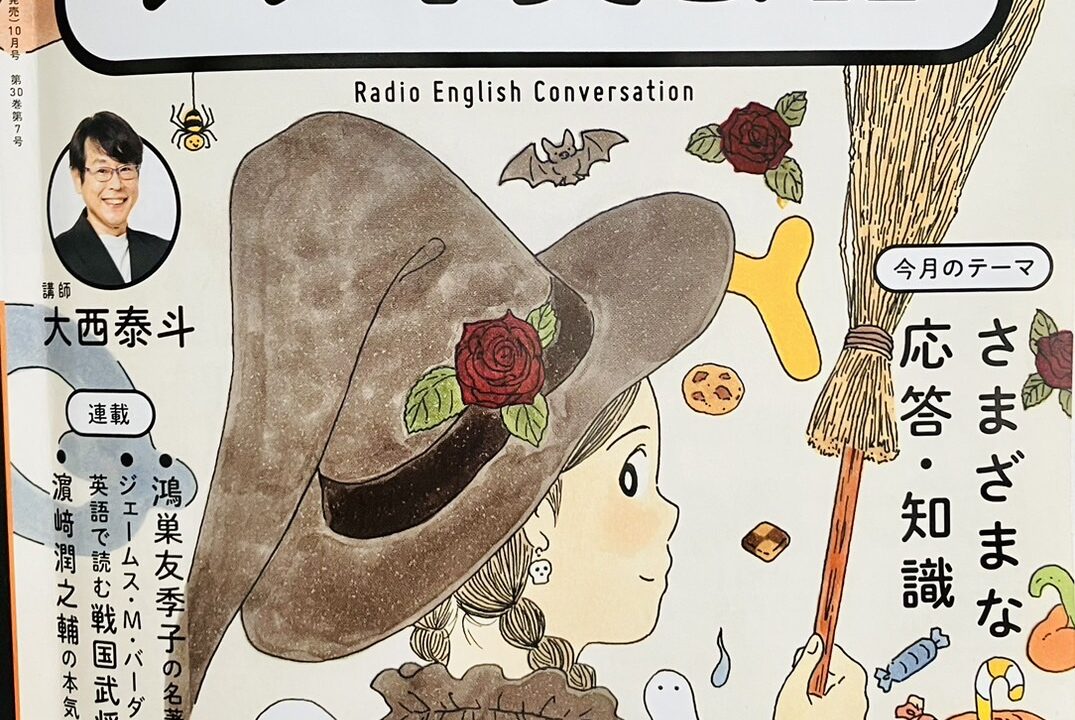【ラジオ英会話】Lesson 122 発言タイプ:申し出への応答②申し出を断る – October 3 Tuesday, 2023

October 3 Tuesday, 2023
Lesson 122 発言タイプ:申し出への応答②申し出を断る
☆Words & Phrases
OK, Renji, that’s all for today. We can study Lesson 5 next time.
**sports festival:
**wanna:
Our school is having its sports festival next Saturday. I’m running. Wanna come?
**niece:
No, my niece wants to go shopping.
**Halloween:
She wants to buy a Halloween costume.

☆Grammar and Vocabulary
① I wanted to ask you something.
これから動詞
「~したい」という文。動詞 want の目的語として to不定詞が使われている。
動詞句的内容が目的語となる場合 「to不定詞」と「動詞-ing形」が使われるが、want には「to不定詞」しか用いることができない。
それは want が「これから」を色濃く意味に含む「これから動詞」だから。「~したい」 は「(これから)~したい」ということ。そのためイメージに矢印(→)を含み「これから」を感じさせる to を用いた「to不定詞」が最適なのである。
「これから動詞」には、
promise
plan
decide
などがある。
② Our school is having its sports festival next Saturday.
予定を表す現在進行形
この文で使われた現在進行形が表しているのは、未来の「予定」。現在進行形の「~している」の延長線上にある使い方。未来の時点で「~している」とすることが「予定」につながっている。
友だち追加でLINEにラジオ英会話で学んだフレーズを実際のビジネスシーンで使うための方法、そして放送のまとめが届きます。
☆Typical Expressions
I’m sorry, I’d love to go, but I’m busy on Saturday.
相手の申し出を断るのは、応じるよりはるかに大変。「ダメです」だけでは、当然角が立ってしまう。相手が気持ちよく納得できるよう、応答は次の要素を含むのが一般的である。
「謝罪」+「願望/残念な気持ち」, but「応じられないこと」+「理由」+「代案」
蒸気の例文では「謝罪 + 願望 + 理由」が使われている。
2つ以上の要素を自由に組み合わせるとよい。【単純なケース】と【意を尽くしたケース】を練習しておく。
【単純なケース】
① Can you give me a ride? – Sorry, I can’t. My car broke down.
→ シンプルな応答だが「謝罪 + 応じられないこと + 理由」が入っている
【単純なケース】
② May I leave work early? I’m afraid I can’t let you. We’re short-staffed today.
→「残念な気持ち + 応じられないこと + 理由」
I’m afraid ~ に、残念に思う気持ちが含まれている
【意を尽くしたケース】
③ Why don’t we go for a drink after work? – I’m sorry. I wish I could, but I have to submit an important report tomorrow morning, so I can’t. How about tomorrow?
→ こちらは最大展開。「謝罪」の後、I wish I could で「願望」を仮定法であるため、実際には行けないことを表している。
I would if I could
でもOK。
その後「理由」、そして「応じられないこと」を告げ、最後に「明日はどう?」と「代案」を提示している。
★Practice
D: Okay everyone. It’s time for today’s practice. The topic for today is turning someone down, or turning down a request. Now, you could just say, “No”.
Could you give me a ride? – No.
But the shock of that is very strong. So, we use these phrases to soften the blow. All right, everyone. Here we go!
– Can you give me a ride? – Sorry, I can’t. My car broke down.
R:
– May I leave work early? – I’m afraid I can’t let you. We’re short-staffed today.
D: All right. Here’s one more. It’s a long one so get ready,
– Why don’t we go for a drink after work? – I’m sorry. I wish I could, but I have to submit an important report tomorrow morning, so I can’t. How about tomorrow?
Great job, everyone.
R: You were excellent!
☆Typical Expressions in Action
Excuse me, but can we swap seats?(ちょっと、席を替われますか?)と言われて。①すみません。私は脚がとても長いので、通路側の席を必要としているのです。
Can I borrow your car for the afternoon?(午後、君の車借りていいかな?)と言われて。
②すみませんが、許可できません。実は私の両親の車なんです。でもあなたを乗せていってあげることはできますよ。それでうまくいきますか?
Can you stay after work a bit? I want to talk to you.(仕事のあと、ちょっと残ってくれる?話があるんだけど)と言われて。
③できればそうするけど、シフトのすぐあとに約束があるんだ。ごめん。
★Ending
O: So David. You don’t like window seats, right?
D: Well, I like window seats, but I can’t use them. My legs are one meter long. I need the aisle seat.
O: So you’re proud of those legs.
D: I guess you could say that!
October 3 Tuesday, 2023
Lesson 122 発言タイプ:申し出への応答②申し出を断る
(日本語訳・解説付き)
☆Words & Phrases
OK, Renji, that’s all for today. We can study Lesson 5 next time.
じゃあ、レンジ、今日はここまで。第5課は次に勉強しましょう。
※ that’s all for today は「今日はこれでお終いです」という決まり文句ですね!
**sports festival: 体育祭
**wanna: = want to
Our school is having its sports festival next Saturday. I’m running. Wanna come?
私たちの学校は次の土曜日に体育祭があります。私は走ります。見に来ますか?
※ Wanna come? は Do you want to come (to our sports festival)? の気軽な省略形ですね!
**niece: 姪
No, my niece wants to go shopping.
いいえ、私の姪が買い物に行きたいのです。
※ 甥は「nephew」ですね!
**Halloween: ハロウィーン、万聖節の前夜(10月31日)の祭
She wants to buy a Halloween costume.
彼女はハロウィーンの衣装を買いたいのです。

☆Grammar and Vocabulary
① I wanted to ask you something.
あなたに尋ねたいことがありました。
これから動詞
「~したい」という文。動詞 want の目的語として to不定詞が使われている。
動詞句的内容が目的語となる場合 「to不定詞」と「動詞-ing形」が使われるが、want には「to不定詞」しか用いることができない。
それは want が「これから」を色濃く意味に含む「これから動詞」だから。「~したい」 は「(これから)~したい」ということ。そのためイメージに矢印(→)を含み「これから」を感じさせる to を用いた「to不定詞」が最適なのである。
「これから動詞」には、
promise(約束する)
plan(計画する)
decide(決める)
などがある。
② Our school is having its sports festival next Saturday.
私の学校は来週の土曜日、体育祭を行います。
予定を表す現在進行形
この文で使われた現在進行形が表しているのは、未来の「予定」。現在進行形の「~している」の延長線上にある使い方。未来の時点で「~している」とすることが「予定」につながっている。
友だち追加でLINEにラジオ英会話で学んだフレーズを実際のビジネスシーンで使うための方法、そして放送のまとめが届きます。
☆Typical Expressions
I’m sorry, I’d love to go, but I’m busy on Saturday.
ごめんなさい。ぜひ行きたいのですが、土曜日は忙しいのです。
相手の申し出を断るのは、応じるよりはるかに大変。「ダメです」だけでは、当然角が立ってしまう。相手が気持ちよく納得できるよう、応答は次の要素を含むのが一般的である。
「謝罪」+「願望/残念な気持ち」, but「応じられないこと」+「理由」+「代案」
蒸気の例文では「謝罪 + 願望 + 理由」が使われている。
2つ以上の要素を自由に組み合わせるとよい。【単純なケース】と【意を尽くしたケース】を練習しておく。
【単純なケース】
① Can you give me a ride? – Sorry, I can’t. My car broke down.
車に乗せていってくれる? – ごめん、できないんだ。車が壊れたから。
→ シンプルな応答だが「謝罪 + 応じられないこと + 理由」が入っている
【単純なケース】
② May I leave work early? I’m afraid I can’t let you. We’re short-staffed today.
早退してもいいでしょうか?残念ながら、できません。今日は人手が足りないのです。
→「残念な気持ち + 応じられないこと + 理由」
I’m afraid ~ に、残念に思う気持ちが含まれている
【意を尽くしたケース】
③ Why don’t we go for a drink after work? – I’m sorry. I wish I could, but I have to submit an important report tomorrow morning, so I can’t. How about tomorrow?
仕事のあと一杯行きませんか? – ごめん。行ければいいのだけど、明朝重要な報告書を提出しなくちゃいけなくて、行けないんだ。明日はどうかな?
→ こちらは最大展開。「謝罪」の後、I wish I could(行けたらいいのに)で「願望」を仮定法であるため、実際には行けないことを表している。
I would if I could(できればそうするのに)
でもOK。
その後「理由」、そして「応じられないこと」を告げ、最後に「明日はどう?」と「代案」を提示している。
★Practice
D: Okay everyone. It’s time for today’s practice. The topic for today is turning someone down, or turning down a request. Now, you could just say, “No”.
Could you give me a ride? – No.
But the shock of that is very strong. So, we use these phrases to soften the blow. All right, everyone. Here we go!
– Can you give me a ride? – Sorry, I can’t. My car broke down.
R:
– May I leave work early? – I’m afraid I can’t let you. We’re short-staffed today.
D: All right. Here’s one more. It’s a long one so get ready,
– Why don’t we go for a drink after work? – I’m sorry. I wish I could, but I have to submit an important report tomorrow morning, so I can’t. How about tomorrow?
Great job, everyone.
R: You were excellent!
☆Typical Expressions in Action
Excuse me, but can we swap seats?(ちょっと、席を替われますか?)と言われて。①すみません。私は脚がとても長いので、通路側の席を必要としているのです。
Sorry. I need the aisle seat because my legs are so long.
Can I borrow your car for the afternoon?(午後、君の車借りていいかな?)と言われて。
②すみませんが、許可できません。実は私の両親の車なんです。でもあなたを乗せていってあげることはできますよ。それでうまくいきますか?
I’m sorry, I can’t let you. It’s actually my parents’ car. I could drive you, though. Does that work?
※ could は「それでいいならできるでしょうね」と控えめなニュアンス
※ Does that work? は便利な表現です。まとめて覚えましょう!
Can you stay after work a bit? I want to talk to you.(仕事のあと、ちょっと残ってくれる?話があるんだけど)と言われて。
③できればそうするけど、シフトのすぐあとに約束があるんだ。ごめん。
I would if I could, but I have an appointment right after my shift. Sorry.
★Ending
O: So David. You don’t like window seats, right?
D: Well, I like window seats, but I can’t use them. My legs are one meter long. I need the aisle seat.
O: So you’re proud of those legs.
D: I guess you could say that!
名古屋駅前にあるビジネス英語&仕事での英語雑談力をつけるための「名古屋BEGビジネス英会話ジム」
営業時間:平日 9:00~22:00 土曜日 9:00~19:00(日祝休み)
〒450-0002 愛知県名古屋市中村区名駅2丁目40-16 名駅野村ビル 5階



